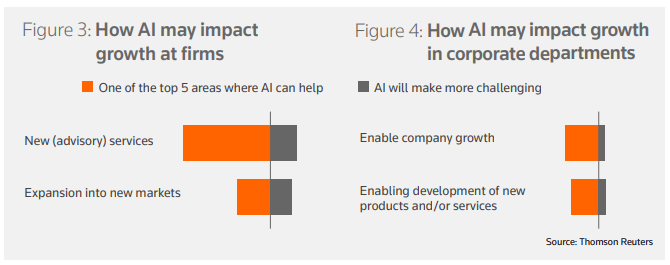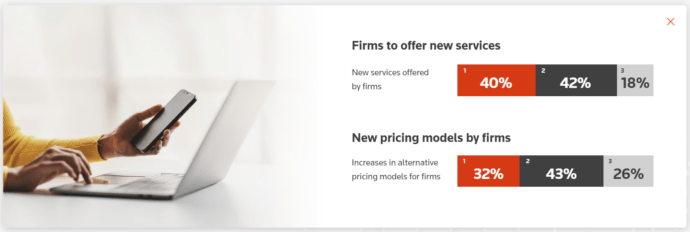AI facilitates the shift in legal services towards advisory roles, offering firms new value exchange opportunities and efficiency.
Jump to:
| The value opportunity |
| Cost pressure considerations |
| Ways AI can help firms |
AI is touching all professions these days, including the legal profession. The opportunities for legal firms of all sizes to leverage AI in ways that will make them more efficient paves the path for revolutionizing how legal firms can serve their clients. Offering a wider range of services more efficiently challenges firms to think about how they can introduce more advisory services to their clients and offers a way to modernize the hourly billing model that has dominated the profession into a more flexible model.
As legal firms navigate these changes and challenges, Thomson Reuters continues to support professional firms incorporating emerging technologies like generative AI. The Future of Professionals report offers insights, while Thomson Reuters continues to lead the way for legal and accounting firms in leveraging language-based models to improve their operations.
The value opportunity
Moving into more consulting and advisory services with AI is changing the way lawyers perform legal services. The introduction of AI into the workflow opens new value exchange opportunities with clients, customers, and stakeholders. Where AI and generative AI can be utilized to take over specific tasks, professionals will have more time to develop more value-add to their clients through improved efficiency and productivity of traditionally time-consuming tasks.

This is not a trend but will become the new standard in the industry. Not only will clients expect more diverse and comprehensive services that include AI, but staff will also expect the burden of more manual tasks to be alleviated by using AI as part of delivering advisory services. On the one hand, AI can help with client work by allowing professionals to solve increasingly complex issues more efficiently, deepen client relationships, and attract new clients or expand the scope of work offered. On the other, it allows internal teams to develop new skills, enhance their professional development, and stay current on relevant industry developments.
AI is also being heralded as a great equalizer between small and large firms. Where advisory services with AI can be accessed and developed by smaller firms that were limited by human resources, they can now compete with larger firms for a more diverse range of clients. Smaller firms will be able to use generative AI to help with a range of administrative and client services freeing up time to spend more time on consultant services delivering more value to an increased number of clients.
Currently, the opportunity for growth in advisory and consultative services ranks third with professionals and AI is seen as potentially facilitating that growth and opening opportunities in new markets. Thomson Reuters has heard a large number of department leaders say they intend to move this priority higher up the agenda.
Cost pressure considerations
72% of professionals agree there will be a shift to more consultative services.
There are three aspects when considering the cost and return of implementing AI into your practice: external pressures, internal limitations, and the potential for greater profitability.
External pressures include an uncertain economic environment, constantly changing regulatory and compliance concerns, inflationary pressures, and increased competition in the market. More importantly, there’s a fundamental shift away from billable hours to project-based pricing accounting for advisory services with AI taking place.
The volume and efficiency of AI output are likely more cost-effective than achieving the same output from human resources. However, even if the commoditized work itself does not become more profitable, professionals will be able to spend more of their time on higher-value, more profitable work.
 | Future of Professionals ReportHow AI is the Catalyst for Transforming Every Aspect of Work
|
Ways AI can help firms
What exactly can AI do to help law firms transition to more advisory services and competitive pricing models? That depends, but a greater amount of professionals believe it’s a matter of when and not if.

All firms will appreciate that AI can help automate many administrative tasks, improve productivity and efficiency, and respond to client requests for information or updates, and more. Considering AI can help:
- Conduct rapid analysis of large data sets.
- Draft outlines
- Identify and predict outcomes, including case outcomes.
- Perform non-billable administrative work with improved accuracy.
- Free up more time for billable work.
- Draft briefs, contracts, and RFPs.
- Assess legal precedents.
- Create content for marketing and thought leadership.
- Improve the health and well-being of over-whelmed associates.
With the bulk of the heavy lifting done, professionals can focus on ensuring accuracy, data-backed advice, listening, and negotiating. Areas that really drive value for clients. Simultaneously, growth capabilities expand for firms, and internal teams who can shift away from being cost centers to growth enablers.
Thanks to AI, the paradigm shift in legal practice to advisory services, diversified offerings, and pricing models is in motion. Professionals must reassess what it means to be an advisor, and how AI will factor into their processes and workflow. Particularly if they intend to stay competitive and meet expanding client expectations for efficiency, productivity, and communication.
For more information on how AI is impacting firms, download the Future of Professionals report.
View the interactive infographic |
|













